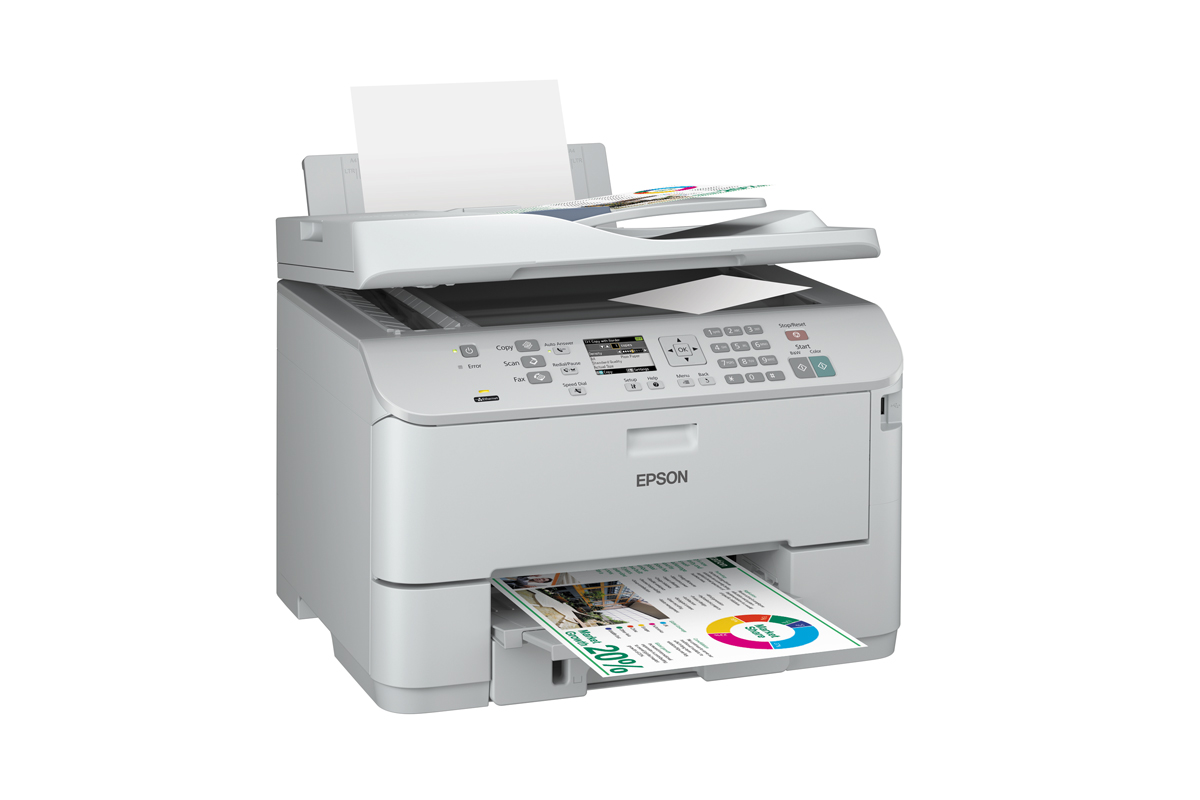Epson Workforce Pro WP-4525 DNF review
The Workforce Pro isn't just an inkjet multifunction printer, it's part of Epson's plan to sweep lasers aside in the business market. Masterstroke or utter folly? Simon Handby takes a closer look in our review.

The Workforce Pro WP-4525 DNF achieves what it sets out to do: it's a competent MFP that, while it may not match an equivalent laser for durability, outright print speed or quality, comes acceptably close. At the same time it's smaller, quieter, cooler and less power-hungry than a laser, making it ideal for the smaller offices and workgroups it's aimed at. Its strongest card, however, is its running costs, which are far lower than any small workgroup laser we've seen.Alongside products such as HP's Officejet 8000 Enterprise, the WP-4525 DNF makes a compelling argument for inkjets at this end of the market, but we can't help but wonder whether the technology is really ready for the higher-volume applications Epson apparently has in its sights. The bulk, noise and complexity of a laser is far less of an issue in large workgroup and departmental applications, where the technology's high power use is offset by the low cost of bulk printing. It'll take a special inkjet to compete here, but the WP-4525 DNF does suggest that Epson knows what it's doing.

We've yet to encounter a bad Epson scanner, and the unit fitted to the WP-4525 DNF is excellent.
We've yet to encounter a bad Epson scanner, and the unit fitted to the WP-4525 DNF is excellent. Captured documents were crisp, accurately exposed and faithful to the colours of the originals. Photo scans at 600dpi and above revealed a slight lack of focus, but contrast was preserved among the very darkest and very lightest shades. Images were unusually good for an office-orientated device, making this scanner suitable if needed for more than just low-resolution archiving. It's quite quick, previewing an A4 page in nine seconds and scanning it at 150dpi in 14 seconds.
Epson's TWAIN interface is the best we've used, although the one big omission is the lack of network scanning support at least using the pre-release drivers we had available. On the subject of omissions, there's no PCL or PostScript printing support, either, although Epson has said that this will follow.
Verdict
The Workforce Pro WP-4525 DNF achieves what it sets out to do: it's a competent MFP that, while it may not match an equivalent laser for durability, outright print speed or quality, comes acceptably close. At the same time it's smaller, quieter, cooler and less power-hungry than a laser, making it ideal for the smaller offices and workgroups it's aimed at. Its strongest card, however, is its running costs, which are far lower than any small workgroup laser we've seen.
Alongside products such as HP's Officejet 8000 Enterprise, the WP-4525 DNF makes a compelling argument for inkjets at this end of the market, but we can't help but wonder whether the technology is really ready for the higher-volume applications Epson apparently has in its sights. The bulk, noise and complexity of a laser is far less of an issue in large workgroup and departmental applications, where the technology's high power use is offset by the low cost of bulk printing. It'll take a special inkjet to compete here, but the WP-4525 DNF does suggest that Epson knows what it's doing.
Maximum print resolution
4,800x1,200dpi
QUOTED PRINT SPEED
Quoted speed, A4 26ppm mono/24ppm colour
TESTED PRINT SPEEDS
First mono page from standby: 8s
25-page mono document (draft) – total time: 1m 31s (16.5ppm)
25-page mono document - total time: 1m 33s (44ppm) (16.1ppm)
24-page colour graphics document - total time: 3m 52s (6.2ppm)
Two 10x8" photos - total time: 5m 10s
Six 6x4" photos – not tested
TESTED SCAN SPEEDS
A4 document Preview: 9s
A4 document 150dpi: 14s
A4 document 300dpi: 20s
6x4" photo 600dpi: 21s
6x4" photo 1,200dpi: 55s
TESTED COPY SPEEDS
A4 document copy mono: 10s
A4 document copy colour: 26s
10-page ADF document copy mono: 1m 48s
10-page ADF document copy colour: 2m 58s
PHYSICAL AND ENVIRONMENTAL
Standard interfaces: USB2, 10/100 Mbit/s Ethernet
Optional interfaces: None
Dimensions (HxWxD): 341x460x420mm
Weight: 13.8kg
Noise: 44dB(A)
Maximum duty cycle (pages per month): 20,000 pages
Power consumption standby: 3W
Power consumption idle: 7W
Power consumption active (copying): 29W
PAPER HANDLING
Maximum paper size: A4/legal
Maximum paper weight: 256gsm
Standard paper inputs (capacity): 2 (330)
Output tray capacity: 150 sheets
Duplex: Yes
GENERAL
Technology: Colour micro piezo inkjet
Language(s): None
Supported operating systems: Windows XP/Vista/7, Windows Server 2003/2008, Mac OS X 10.4.11 or later
Memory: 128MB
Upgrades: 250-sheet paper tray
BUYING INFORMATION
Price: £165 (£198 inc VAT)
Cost per mono A4 page: 0.84p (ex VAT, ISO/IEC 24711)
Cost per colour A4 page: 2.24p (ex VAT, ISO/IEC 24711)
Capacity of supplied ink (pages): Not disclosed
Warranty duration and terms: One-year onsite
Part code: C11CB28301BY
Get the ITPro daily newsletter
Sign up today and you will receive a free copy of our Future Focus 2025 report - the leading guidance on AI, cybersecurity and other IT challenges as per 700+ senior executives
After a brief career in corporate IT, Simon Handby combined his love of technology and writing when he made the move to Computer Shopper magazine. As a technology reviewer he's since tested everything from routers and switches, to smart air fryers and doorbells, and covered technology such as EVs, TVs, solar power and the singularity.
During more than 15 years as Shopper's long-time printer reviewer, Simon tried, tested and wrote up literally hundreds of home, small office and workgroup printers. He continues reviewing smart products and printers for a variety of publications, and has been an IT Pro contributor since 2010. Simon is almost never happier than when surrounded by printers and paper, applying his stopwatch and a seasoned eye to find the best performing, best value products for business users.
-
 M&S suspends online sales as 'cyber incident' continues
M&S suspends online sales as 'cyber incident' continuesNews Marks & Spencer (M&S) has informed customers that all online and app sales have been suspended as the high street retailer battles a ‘cyber incident’.
By Ross Kelly Published
-
 Westcon-Comstor unveils new managed SOC solution for Cisco partners
Westcon-Comstor unveils new managed SOC solution for Cisco partnersNews Powered by Cisco XDR, the new offering will enable partners to tap into new revenue streams, the company said
By Daniel Todd Published
-
 More than 5 million Americans just had their personal information exposed in the Yale New Haven Health data breach – and lawsuits are already rolling in
More than 5 million Americans just had their personal information exposed in the Yale New Haven Health data breach – and lawsuits are already rolling inNews A data breach at Yale New Haven Health has exposed data belonging to millions of people – and lawsuits have already been filed.
By Emma Woollacott Published